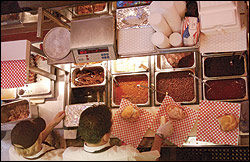It’s a long way from Muenster, Texas, to Pioneer Square, and it took the Lehnertz family more than 50 years to make the trip, but most of the people who’ve sampled the fare at Longhorn Barbecue’s Outpost on First Avenue are glad they took the trouble. There were nine boys in the WWII Lehnertz generation, and the older ones looked after the younger. When a big brother back from the war bought into a beer joint, he brought others into the business. With the beer joint came a barbecue pit, complete with cook. Over time, the Lehnertzes learned from him; over time, the barbecue tail began to wag the beer dog. Catering was nothing new to the family—Mom Lehnertz did all the Muenster functions, and her menfolk took to it as well.
Brother Chick was on the rodeo circuit; when he retired for love in Washtucna, Wash., he was joined by younger relatives, five in all: four brothers, one cousin. Before long, history was repeating itself, with a barbecue pit in back of a beer joint on Spokane’s Wall Street off Highway 2 to Idaho. Once again, barbecue proved the big draw. Then came a sit-down restaurant serving the family’s “Southern Pit Style” barbecue, in East Spokane, the first of three locations around town. By the time family grandson David Alan Davis left the military in 1992 and joined the business, the Longhorn retail was just the tip of the corporate iceberg. Today the company’s processing center near Spokane ships millions of ribs a month to supermarkets and restaurant clients across the United States.
But that wasn’t the side of the operation that interested young Davis. By the end of the 1990s, he was spending his time developing a Longhorn retail presence west of the Cascades. The first to open was the production facility, restaurant, and “duelin’ piano saloon” on C Street in Auburn. “Outposts” in Kent and Renton serve pretty much the full Longhorn menu, while a CCV (command catering vehicle) performs barbecue outreach between Kent and Southcenter, and a UDV (urban delivery vehicle—tricycle, actually) performs the same service on a retail scale out of Pioneer Square.
Considering the overall size of the Longhorn operation—it split into two cooperating but independent firms on either side of the mountains in 2002—west-side CEO Davis has been remarkably willing to let growth come organically. It took word of mouth a year to reach Seattle Weekly‘s office about the Pioneer Square outlet just four blocks away. But it took only one phone call to make us welcome. According to Davis, the amazing degree of enthusiasm one encounters among Longhorn people—from delivery stiffs to top management—is due to a 50-year family tradition: “I manage the way I was raised. First come the employees, then the customers, because if you don’t have happy employees you’re not going to have happy customers, either.” If that formulation is correct, Longhorn employees must be on top of the world most of the time, because the representative sample of customers who took part in two tastings of Longhorn delivery items had barely a quibble to make. The most serious aficionado of the bunch pointed out that Longhorn’s product isn’t “authentic,” which, if authentic means “one-cook, one-pit” idiosyncracy, is certainly true. There are as many styles of barbecue as there are barbecuers, but the Longhorn approach, while middle-of-the-road—mild-smoked, moist but not mushy, made for slathering to individual taste with tangy sauce—seems to appeal to a broad spectrum of carnivores, occasional to voracious.
And if you cast your mind back over ribs and pulled porks past, you’ll probably admit that it’s not all that easy to pull off. You have to start with sound fixin’s and cook them carefully. You won’t find ribs that are more bone and fat than meat in a Longhorn tub ($14.50, over a pound); the skin on a Longhorn chicken ($7.75 à la carte order, whole bird $9, two-bird tub $17) is spicy-crispy-tasty on its own, not greasy or soggy with unrendered fat. The German sausage ($8.75 with corn bread and one side) is lean, mild, and firm. Try it in the Longhorn Chili Dog with cheese and onions ($7.95).
We didn’t, collectively, care much for the thin-sliced beef, finding it dryish and underflavored, and the pulled pork, while lean and well-textured, didn’t show much character—until we added sauce. Friends, I am here to tell you that Longhorn’s red sauce is so good you could eat it with a spoon, if you didn’t mind not using your tongue the rest of the day. This is sauce that brings meat to life without denying its basic meatiness. It’s potent enough that a dab enlivens every bite, but discreet enough that you can pour it on till your eyes water. All Longhorn sides (baked beans, potato salad, macaroni salad, coleslaw—$1.75 per half-pint) are fairly mild-flavored, but just what the doctor ordered to offset the lingering heat. (We suggest you avoid the green salad side; Longhorn’s heart’s not in it, and it’s about as generic as they come.)
Downtowners, long largely barbecue-deprived, can sample all these wares in the convenience of their offices and homes. In time—after all, it took 50 years to get this far—more far-flung Seattleites may have the pleasure of seeing Longhorn’s little red trike pull up out front. While negotiating the handoff, take time to chat with your delivery person; the attitude you encounter’s guaranteed to be as lively as the sauce.
Longhorn Barbecue Outpost, 103 First Ave. (at Yesler), 206-341-9696, PIONEER SQUARE; 10:30 a.m.–9 p.m. Sun.–Thurs., 10:30 a.m.–11 p.m. Fri.–Sat. Longhorn Barbecue Restaurant, 635 C St. S.W., 253-804-9600, AUBURN; 10:30 a.m.–9 p.m. Sun.–Thurs., 10:30 a.m.–10 p.m. Fri.-Sat.








